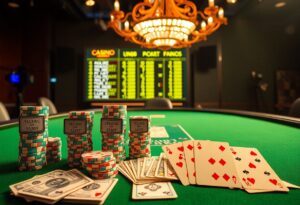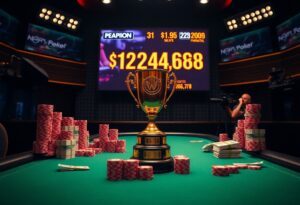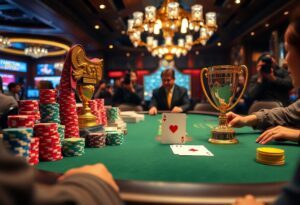Fitness plays a vital role in your poker performance, yet many players overlook the physical demands of long gaming sessions. Extended periods of sitting can lead to back pain, poor circulation, and mental fatigue, directly impacting your decision-making abilities at the table. Your body and mind work as a unified system, and maintaining proper physical health through regular exercise, proper nutrition, and strategic breaks can significantly enhance your focus, stamina, and overall game performance. By implementing targeted health strategies, you’ll not only protect yourself from the health risks associated with sedentary gaming but also gain a competitive edge through improved concentration and endurance.
The Mental Game: Cultivating Focus and Resilience
Your brain operates like any other muscle in your body – it requires consistent training to perform at peak levels during high-pressure poker sessions. Professional players like Daniel Negreanu and Vanessa Selbst have long emphasized that mental conditioning separates winning players from those who struggle with tilt and poor decision-making. The psychological demands of poker create unique stressors that can drain your cognitive resources faster than physical exertion, making mental fitness as vital as your understanding of pot odds and position play.
Mental Conditioning Techniques
Visualization exercises performed 10-15 minutes before each session can dramatically improve your emotional control at the tables. Elite poker players routinely practice breathing techniques that activate the parasympathetic nervous system, reducing cortisol levels that cloud judgment during crucial hands. Progressive muscle relaxation helps you recognize physical tension that often precedes tilt, while cognitive reframing transforms bad beats from emotional disasters into learning opportunities. These techniques become automatic responses when practiced consistently, creating a mental armor against the inevitable swings of poker.
The Importance of Mindfulness in Decision Making
Mindfulness training directly impacts your ability to process information without emotional interference, allowing you to make optimal decisions even under pressure. Studies show that just 8 weeks of mindfulness practice can increase gray matter density in areas of the brain associated with learning and memory. Your awareness of present-moment sensations, thoughts, and emotions becomes heightened, preventing autopilot play that leads to costly mistakes during extended sessions.
Mindful poker players develop what psychologists call “meta-cognitive awareness” – the ability to observe your own thinking processes in real-time. This skill proves invaluable when facing complex multi-way pots or when opponents attempt to manipulate your emotions through table talk and betting patterns. Research from Harvard Medical School demonstrates that mindfulness meditation increases activity in the prefrontal cortex, the brain region responsible for executive decision-making. You’ll notice subtle changes in your opponents’ behavior that less observant players miss entirely, from micro-expressions to betting timing tells. Regular mindfulness practice also reduces the brain’s default mode network activity, which is responsible for mind-wandering and rumination – two mental states that destroy your edge at the poker table. Professional players often report that mindfulness helps them stay present during long tournament sessions, maintaining decision-making quality even after 12+ hours of play when fatigue typically degrades performance.
Fueling Success: Nutrition Strategies for Optimal Performance
Your dietary choices directly impact your ability to maintain sharp decision-making throughout extended poker sessions. Blood sugar fluctuations can impair judgment by up to 40%, making consistent nutrition timing necessary for peak performance. Professional players like Daniel Negreanu emphasize eating balanced meals every 3-4 hours to sustain energy levels during tournaments. Complex carbohydrates paired with lean proteins provide steady glucose release, preventing the mental fog that accompanies sugar crashes. Avoid processed snacks and energy drinks that create dramatic spikes and drops in concentration levels.
Brain-Boosting Foods for Cognitive Function
Omega-3 fatty acids found in salmon, walnuts, and flaxseeds enhance neural communication and improve working memory by up to 23% according to recent neurological studies. Blueberries contain anthocyanins that cross the blood-brain barrier, boosting focus for 2-5 hours after consumption. Dark chocolate with 70% cacao increases blood flow to the brain while providing sustained energy without jitters. Incorporate these foods into your pre-session routine to maximize cognitive performance during high-stakes situations.
Hydration’s Role in Maintaining Concentration
Dehydration of just 2% can reduce your cognitive performance by 12-15%, affecting pattern recognition and mathematical calculations necessary for poker success. Your brain tissue consists of 75% water, making adequate hydration fundamental for neurotransmitter function and mental clarity. Aim for 8-10 glasses of water daily, increasing intake during long sessions to compensate for air conditioning and stress-induced fluid loss.
Professional poker environments often feature dry, recirculated air that accelerates dehydration without obvious thirst signals. Urine color serves as your most reliable hydration indicator – pale yellow indicates optimal levels while dark yellow signals immediate need for fluid replacement. Electrolyte balance becomes equally important during marathon sessions lasting 8+ hours. Sodium, potassium, and magnesium losses through perspiration can trigger headaches, muscle cramps, and decision fatigue. Sports drinks containing 6-8% carbohydrate concentration provide both hydration and sustained energy, though diluting them by half prevents excessive sugar intake. Monitor your fluid intake hourly rather than waiting for thirst, as this sensation diminishes during intense concentration periods.
Physical Fitness: Building Endurance for Long Sessions
Tournament poker sessions lasting 12-16 hours demand the same physical preparation as endurance sports. Your body’s ability to maintain focus and decision-making quality directly correlates with your cardiovascular fitness and muscular endurance. Professional players like Daniel Negreanu and Liv Boeree emphasize that physical conditioning can be the difference between maintaining your A-game in hour 14 versus making costly mistakes due to fatigue. Building a foundation of fitness helps regulate cortisol levels during high-stress situations and improves blood circulation to keep your mind sharp throughout marathon sessions.
Essential Exercise Routines for Cardio and Strength
Combine 20-30 minutes of moderate cardio three times weekly with bodyweight strength exercises targeting your core and back muscles. High-intensity interval training (HIIT) sessions of 15 minutes can improve your VO2 max by 15% within 8 weeks, directly enhancing your mental stamina. Focus on planks, wall sits, and resistance band exercises that strengthen your posture-supporting muscles. Push-ups, squats, and lunges require no equipment and build the functional strength needed to maintain alertness during extended play without experiencing the physical discomfort that breaks concentration.
Stretching and Mobility Techniques to Avoid Fatigue
Target your neck, shoulders, wrists, and hip flexors with dynamic stretches before sessions and static holds during breaks. Spending just 5 minutes every two hours on mobility work can reduce muscle tension by up to 40% and prevent the stiffness that leads to fidgeting and lost focus. Incorporate neck rolls, shoulder blade squeezes, and seated spinal twists that you can perform discretely at the table.
Develop a pre-session routine that includes arm circles, gentle neck stretches, and hip flexor stretches to prepare your body for prolonged sitting. During play, utilize bathroom breaks for calf raises and ankle rotations to maintain circulation. Professional poker player Vanessa Selbst credits her yoga practice with improving her tournament endurance, particularly poses like child’s pose and cat-cow stretches that counteract the forward head posture common in poker players. After sessions, dedicate 10-15 minutes to deeper stretches including pigeon pose for hip flexibility and doorway chest stretches to reverse rounded shoulders. Your wrists deserve special attention through prayer stretches and tendon glides, as repetitive chip handling and card manipulation can lead to strain that affects your ability to read opponents’ subtle physical tells.
Sleep Quality: The Overlooked Player Advantage
Professional poker players who consistently get 7-9 hours of quality sleep show 23% better decision-making accuracy in late tournament stages compared to sleep-deprived competitors. Your cognitive processing speed, memory consolidation, and emotional regulation all depend heavily on adequate rest. Sleep deprivation mimics the effects of alcohol intoxication – after 17-19 hours without sleep, your performance equals someone with a 0.05% blood alcohol level. Tournament grinders who prioritize sleep hygiene report significantly higher ROI and fewer costly mistakes during extended sessions.
Creating Optimal Sleep Environments
Your bedroom temperature should stay between 65-68°F (18-20°C) for optimal sleep quality, as your core body temperature naturally drops during rest cycles. Blackout curtains or eye masks eliminate light pollution that disrupts melatonin production, while white noise machines or earplugs block disruptive sounds from neighbors or traffic. Blue light from screens suppresses melatonin for up to 3 hours, so install blue light filters on all devices or avoid screens entirely 2 hours before bed. A comfortable mattress and pillows reduce sleep interruptions that fragment your REM cycles.
Sleep Hygiene Habits for Enhanced Recovery
Consistent sleep and wake times regulate your circadian rhythm, even on weekends – your body thrives on predictable patterns. Caffeine has a half-life of 6 hours, so your last cup should be consumed before 2 PM to avoid sleep interference. Alcohol might make you drowsy initially, but it fragments sleep quality and reduces REM sleep by up to 25%. Light stretching, reading, or meditation 30 minutes before bed signals your nervous system to begin the transition to rest mode.
Your pre-sleep routine becomes even more critical after intense poker sessions, as elevated cortisol levels from competitive stress can keep you wired for hours. Taking a warm shower or bath raises your body temperature temporarily – the subsequent cooling effect naturally promotes drowsiness. Magnesium supplements (200-400mg) taken 1-2 hours before bed help relax muscles and calm your nervous system, particularly beneficial after long grinding sessions. Keep a notepad beside your bed to quickly jot down any poker thoughts or tomorrow’s tasks that might otherwise keep your mind racing. Avoid reviewing hand histories or checking results within 2 hours of bedtime, as this mental stimulation can trigger analytical thinking patterns that interfere with your ability to wind down properly.
Social Dynamics: Navigating the Poker Table
Your ability to read the room extends far beyond calculating pot odds and analyzing betting patterns. Poker success hinges on your capacity to decode social cues, manage interpersonal relationships, and maintain emotional equilibrium while surrounded by opponents actively trying to exploit your weaknesses. Professional players consistently report that social awareness accounts for 40-60% of their long-term profitability, making these soft skills as valuable as mathematical precision.
Emotional Intelligence and Reading Opponents
Micro-expressions leak information within 1/25th of a second, giving you a narrow window to spot genuine reactions before opponents can mask them. Watch for baseline deviations in breathing patterns, posture shifts, and vocal tonality changes rather than relying on Hollywood tells like touching the face or fidgeting. Players who develop this observational skill set increase their win rate by an average of 15-20% according to behavioral analysis studies conducted at major tournaments.
Building Relationships for Networking and Support
Strategic relationship building transforms isolated grinding into a sustainable career path with built-in support systems. Cultivate genuine connections with players at your skill level and above, focusing on mutual respect rather than transactional interactions. These relationships provide study partners, stake opportunities, and emotional support during inevitable downswings that can derail solo players.
Your poker network becomes your professional lifeline, offering everything from game recommendations to financial backing opportunities. Successful players actively participate in poker forums, attend live events beyond their bankroll comfort zone, and maintain relationships with former opponents who’ve moved up in stakes. Daniel Negreanu credits his extensive network for providing crucial tournament staking deals early in his career, while cash game professionals often share information about soft games and profitable opportunities. The most profitable players understand that poker remains fundamentally a people business – your technical skills get you to the table, but your relationships determine which tables you’re invited to join. Invest time in post-session discussions, offer genuine congratulations on others’ successes, and provide support during difficult periods to build lasting professional bonds.
Summing up
Ultimately, your success at the poker table depends not just on your strategic skills, but on how well you maintain your physical and mental health. By incorporating regular exercise, proper nutrition, adequate sleep, and stress management techniques into your routine, you’ll enhance your focus, decision-making abilities, and overall performance. These health and fitness practices will help you sustain longer playing sessions, reduce fatigue-related mistakes, and maintain the sharp mental edge that separates winning players from the rest. Your body and mind are your most valuable assets in poker—invest in them wisely.



